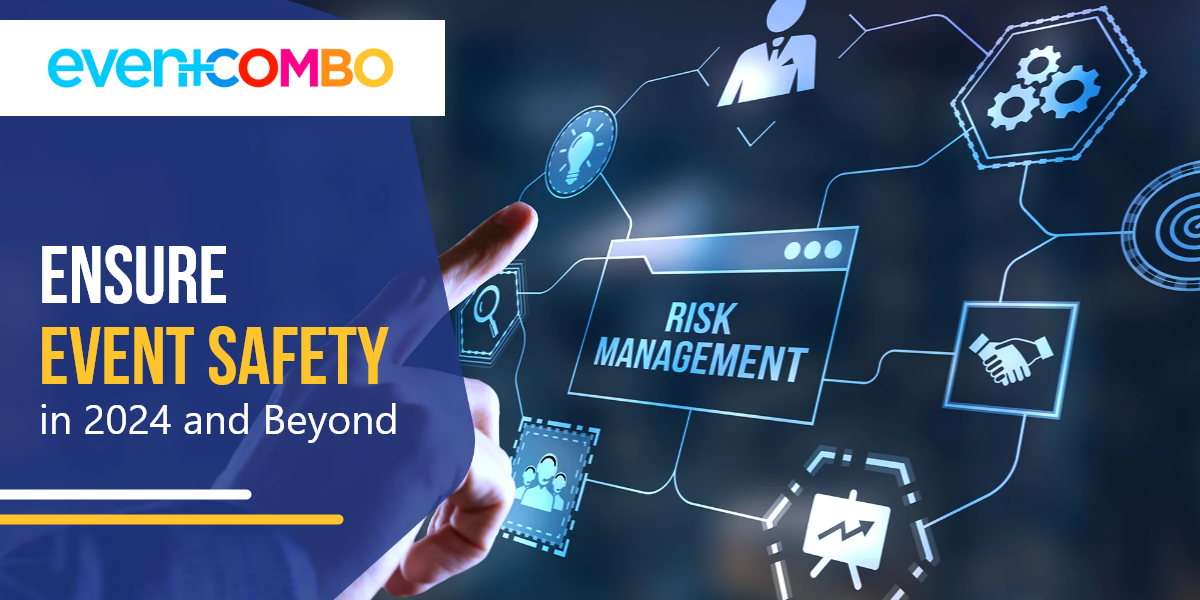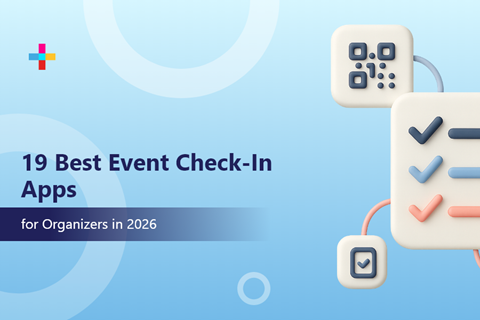

With the events industry predicted to reach a global value of $2046.7 billion by 2032, growing at a CAGR of 6.4% from 2023 to 2032, it is no wonder that event risk management is a frontrunner as a differentiator for event management companies. Most events — from weddings to corporate sales conferences, fundraising initiatives, and educational seminars, need careful planning in order to minimize risk.
Several unknowns can arise from event planning, and these unknowns can swiftly cause damage to people, property, and, consequently, your company’s reputation. In light of this, it is no surprise that more than 67% of event planners want to impose strict safety and security policies for their events.
To help you plan an event that demonstrates your accountability and due diligence toward risk management, we have created this event risk management guide.
Let’s get started!
What Is Event Risk Management?
Event risk management is the process of identifying potential hazards ahead of time and developing a strategy to reduce each one through readiness and prevention.
Now, when we talk about potential hazards, it may seem that event risk management is related to every aspect of safety. However, that is not true. The concept of "risk" is fairly broad and does not only refer to events involving safety. Any significant issue that could arise during an event is covered under risk management for events, including but not limited to:
And more...
The dangers listed above are not all-inclusive, as they can differ depending on the nature of the event, the location, and the potential consequences of the risk. Combining these tactics is best, especially when dealing with larger risks.

Prioritizing risks through risk analysis is another necessary component of effective event risk management. This helps event managers make better decisions even with limited resources by demonstrating the relative importance of each risk.
As evidenced above, event risks can come in many different forms. However, they can still be broadly categorized, as we have done below.
Types of Risks in Events
There are four different types of event risks, as highlighted below:
1. Operational Risks
These are the risks associated with conducting business daily, most of which are preventable. It could result from broken systems, ineffective procedures, or a failure to adhere to instructions strictly!
For instance, let's say your company organizes a conference. The keynote speaker requested a presentation of his research work to be played in the background as he commenced his lecture. However, your projector malfunctioned at the last minute and would not play the slides. This is an operational failure. Operational hazards are typically preventable if all systems and procedures are thoroughly examined before the event starts.
2. Opportunity Risks
These are the least harmless event risks, which essentially consist of the likelihood that an option selected will perform worse than the alternatives rejected during the selection process.
For instance, let's say your company organizes a corporate sports event, such as a cricket match. To save money, you choose to work with a new supplier rather than your reliable one for the refreshments you need for the occasion. However, the new supplier miscalculates the number of food packets and energy drink bottles required for all participants or does not provide high-quality refreshments, and it damages your company's reputation, which makes it harder for you to get other contracts with the corporate startup.
3. Risks of Uncertainty
These risks are related to the potential for unforeseen circumstances to interrupt the seamless execution of an event. These risks are usually uncontrollable as they appear out of the blue; however, insurance can lessen the harm caused by their circumstances.
For instance, let's say your company organizes an indoor wedding. However, there was a fire at the location due to a short circuit. In light of this, your first priority is to get everyone out of there safely as soon as possible; however, your venue's equipment — the stage, booths, etc. — caught fire. If there are no casualties, you can expect to have the expense of the equipment and setup for the event covered by event insurance, with no legal liabilities.
4. Risks of Hazards
These risks are similar to the risks of uncertainty, but there are some subtle differences. Hazard risks may arise from careless handling or poorly designed workspaces, potentially leading to dangerous situations that could seriously injure process participants.
For instance, let's say your company organizes a political gathering. However, owing to inadequate protection, a renegade opposition party agent enters and causes a deadly commotion when the party head is speaking. Such risks should be accounted for by carefully monitoring various event components before the event is scheduled to start.
Conducting an Event Risk Assessment
An event risk assessment is one of the most important steps in identifying and controlling possible event risks that can affect your event. It is crucial since it guarantees participant safety and helps your upcoming event go off without a hitch.

Risks to evaluate for this purpose include:
1. General Considerations: These are broad hazards, such as unforeseen weather patterns, technological malfunctions, or logistical difficulties, that can impact any event. For instance, bad weather might still affect indoor activities and result in problems like power outages.
2. Crowding Risks: There is a chance that large crowds will get too crowded, necessitating emergency evacuations. To ensure proper safety, creating and implementing strategies for managing crowds effectively is essential.
3. Health Risks: Event managers need to take health risks into account because large gatherings often result in the transmission of contagious diseases. Some useful initiatives include sanitation stations and health screenings.
4. Location Risks: Each event location has specific hazards, such as restricted entry points or structural problems, that call for customized solutions.
5. Security Risks: These include defending individuals and assets against dangers such as theft, damage, and illegal entry. These hazards can be reduced by putting security measures and surveillance in place.
6. Personal Safety: These risks include the possibility of mishaps or accidents that cause harm to attendees. The two most important preventive actions are ensuring that event areas are safe for attendees and that medical help is available.
7. Virtual (or Digital) Risks: While they have their own set of possible problems, online events can avoid many of the risks associated with in-person gatherings. For example, event managers need to ensure that all technology associated with the digital event works fine and has good internet connectivity. Issues like data breaches should also be taken into account.
Once event managers conduct a risk assessment, they should create a thorough checklist that covers all of these so that nothing gets missed on the day of the event! A detailed checklist of evaluated event risks can help event companies create a safer and more enjoyable event, whether it is in-person or virtual.
Creating a Plan to Manage Identified Event Risks
Following the creation of an event risk checklist, you now need to make a plan to address them.

For each risk opportunity, anticipating any possible problems and having a solid plan can go a long way in establishing your reputation as a trusted event management company. Taking this strategy may prepare you for possible risks while reducing the pain points and improving the whole experience.
With the right risk management plan, you may foster an atmosphere where guests can focus on having fun at the event by taking proactive steps to mitigate event risks.
Event Cancellation
In extreme cases, the event might require to be postponed or cancelled altogether. While your event management company may suffer a dent in its reputation, it is a better option to prevent any unprecedented disasters.
Let’s check out the steps to postpone and cancel an event, respectively.
How to Postpone Your Event for Attendees?
Here are the steps to postpone an event and inform your attendees:
1. Decide whether to permit guests to cancel their registration if the postponement causes an issue.
2. Make sure your refund policy is clear, and decide whether or not you will handle refunds.
3. Create a planner alert to be issued each time an invitee cancels their registration if you plan to handle refunds. This will help you keep track of cancellations as soon as they happen.
4. Make a plan for handling continuing education credits that have a deadline.
5. Decide how you will respond to registrants' requests for reimbursement of actual event-related expenses.
6. Think about the consequences if participants choose to maintain their reservations for hotels and flights. Think of when and how they will reschedule their journey if the event is postponed.
7. Make a regret survey that will be emailed to the registrant in the event of a cancellation in order to get more information from those who choose to withdraw.
8. Close registration for your event as soon as you decide to postpone the event in order to prevent anyone else from doing so.
9. Draft and send personalized emails to inform guests effectively. Remember to include guests, waitlisted invitees, and registrations awaiting approval.
10. Ensure you include detailed information on registering for the event in case it is rescheduled and how to change or cancel hotel and flight reservations.
11. Make sure your website is up to date with all the information required regarding postponing an event. Take into consideration including FAQs for attendees on a separate webpage.
12. Update apps, including tools for managing abstracts, appointment scheduling, and mobile event apps.
How to Cancel Your Event for Attendees?
Here are the steps to cancel an event and inform your attendees:
1. Notify invitees and registrants via email about the cancellation of the event.
2. Make the appropriate updates to your website to reflect the event cancellation.
3. Consider creating a second page on the website with FAQs and a phone number or email address specifically for responding to inquiries from attendees.
4. Provide credit card refunds to those who paid online and verify that all registrants received their money back.
5. Update your mobile event app, appointment software, and abstract management tools. Modify or remove any alerts.
6. Give attendees a conduit to ask about any issues they may have, resources to support them throughout the cancellation, and explanations for the cancellation.
7. While a well-crafted event risk management plan (plus a backup!) is the ideal way to manage event risks, what if you could follow some best practices to control event risks if they do take place?
8. Here are some event risk control tips and strategies.
Event Risk Control Tips and Strategies
The three best practices that augment your event risk management plan to ensure greater safety and resilience for your risk prevention and mitigation measures:
1. Communicate Plans and Guidelines to Staff Members
Your staff members can act as a driving force behind identifying event risks within time and act to prevent or mitigate them so that event attendees can have a safe and happy experience.
This is why it is essential to hire active event personnel and volunteers with specific skills (like an eye for detail) and ensure they are prepared for as many of the risks highlighted above, especially if your event management company is handling a large event.

You will also require paperwork, efficient pre-event meetings, and maybe additional people managers in order to communicate with your team. You can further bring in individuals who have worked at comparable events and encountered comparable possible dangers in order to do this. These people frequently offer expertise that you can use to adjust your strategy.
2. Rate Any Identified Risk Based on Severity and Likelihood of Occurrence
Event managers should sort the event risks on the list they made while evaluating possible risks that can derail your event according to their likelihood and severity. You can further prioritize and place the items most likely to occur or those with the highest degree of severity or risk towards the top.

Once that is done, you should designate owners or stakeholders for every risk or risk category at this point. Determine which stakeholders are most pertinent to the event risk at hand and then initiate contact with them to discuss taking ownership of that risk. These steps can go a long way in preventing and handling a possible risk incident quickly, even if it does occur.
3. Run Trials for Your Contingency Plans, If Possible
Based on how each event risk ranks in your list, creating contingency plans is imperative for conducting events risk-free. You should prioritize those that are more likely to occur or those that are the most severe, as illustrated above.
Together with your event team, the previously identified stakeholders should assist in creating robust contingency plans that are appropriate for each relevant risk. For instance, if a third-party supplier provides refreshments for a meet-and-greet, they must be ready to provide a backup plan that outlines what they will do if they run out of a particular item, are delayed, etc. Having a backup plan apart from the vendor's plan is also a smart idea, especially when dealing with third-party vendors.

Last but not least, we will discuss how you should evaluate risk management success.
Evaluate Your Event Risk Management Success
It is vital to assess your risk management skills after the event. You can review the checklist you used for the event safety assessment when you were planning. This checklist not only directs your preliminary risk assessment and is a gauge for managing those risks, but it can also act as a tracker for how well you managed any risk incidents that did crop up during the event.
You can also include a safety section in your surveys after the event, requesting input from the attendees regarding the safety precautions put in place. Were they discernible? Did they feel safe? This candid criticism is really helpful.
Keeping note of any problems or reports from the event, such as lost or stolen property or safety issues, is an essential next step. Event managers should examine these reports to determine the areas where their plan worked and the areas where it didn't.
Invest in Event Technology to Help Tackle Event Risks Better
For your event management business to be successful in the long run, event risk management is indispensable. One single mishap can make customers lose faith in your company or worse. By taking the appropriate actions, you may create processes that lessen the possibility of risks materializing into reality while still producing fantastic experiences.
Furthermore, you may increase the productivity of your event workflows by using the appropriate event risk management software, like Eventcombo. Prioritizing our efforts toward risk management is now more crucial than ever, with wild weather patterns increasing in frequency and social media amplifying reputational threats. With the right event management platform, you can empower your on-site support teams to perform to their best, ensuring that attendees enjoy seamless and secure events. Leverage Eventcombo to create such event experiences for your attendees — book a free demo today!

Professional certifications for event planners do more than provide a solid foundation in the field; they offer valuable exposure to the dynamic world of event planning and insights from prominent industry experts.

Choosing the right event management platform is vital for event professionals navigating the growing demand for in person , virtual, and hybrid events. Modern planners need solutions that offer robust features,...

Attendees don't notice good check-in. They only notice bad check-in. And planners know check-in is the first moment where their behind-the-scenes work gets exposed.